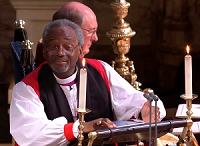I am just back from Belgrade, where I had invited Steve Timmis to reflect on the theme of what Gospel Centred means for life, church, community, preaching and church-planting in 21st century Europe. The 330 people from 30 European countries asked stimulating and pertinent questions. I was inspired and hopeful as I watched the interaction with these mostly young church-planters – there is real hope for our continent if we all carry the gospel into our contexts and apply it in life-giving ways! The gospel is the power of God for salvation, and also for transformation, of the individual, the church and through the church the world!
Barely 10 days later, the wedding of the Harry and Meghan came along, and with it that sermon from Michael Curry. I must confess that I didn’t listen to it live, but I was so intrigued by the positive reaction that it got from across the board – atheists, liberal Christians, evangelicals, some of them friends and colleagues – that I acquainted myself with it online. Based on a careful reading of the full transcript (here) this is a synopsis of the 15 minute, 1545 word sermon:

After a Trinitarian prayer Michael Curry quotes SoS 8:6-7 on love being as strong as death and segues straight into a telling quote from MLK on the redemptive power of love and its eschatological promise.This premise is the theme of the rest of the sermon.
He first illustrates his point by recalling the newly weds romantic feelings for each other, extrapolating from that sense of rightness (albeit a self-centred rightness at this point) to the rightness of love in its more prosaic forms. He argues that the feeling of the rightness of love is actually a signpost to the fact that God made us and since God is love, when we act in love, we act out of our createdness. Since our Creator is love, his creatures should act in love, and will feel right when they do. Medieval poems and 1 John 4 7-8 are quoted in support of this thesis which assumes universal and omnipotent proportions in a sequence of rhetorical flourishes.
Bringing our attention again to the living, breathing example of the young couple in love and getting married, Curry invites us to see that not only is love powerful and right because of its source, but also because it is the centre of Jesus’ teaching (referencing Matthew 22). To quote : A movement grounded in the unconditional love of God for the world – and a movement mandating people to live that love, and in so doing to change not only their lives but the very life of the world itself.
 Bishop Curry then demonstrated that this power could effectively change the world by showing how this idea sustained and liberated African American slaves; even if the power of this passage seems to owe more to rhetoric and poetry than to logic and rigour. Quoting an old Spiritual, the words roll over us – ‘healing a sin-sick soul, Jesus dies to save us all, He gave up his life for the wellbeing of the world…’
Bishop Curry then demonstrated that this power could effectively change the world by showing how this idea sustained and liberated African American slaves; even if the power of this passage seems to owe more to rhetoric and poetry than to logic and rigour. Quoting an old Spiritual, the words roll over us – ‘healing a sin-sick soul, Jesus dies to save us all, He gave up his life for the wellbeing of the world…’
Commenting on this, Curry shows that the mystery and power of the death of Jesus is in its exemplary nature : “Love can be sacrificial, and in so doing, becomes redemptive. And that way of unselfish, sacrificial, redemptive love changes lives, and it can change this world.”
A dazzling anaphora follows, inviting the listeners to “imagine a world” where human beings live out that kind of love, and what kind of world we would have if “love was the way.”
The soaring conclusion borrows from the language of the New Testament to describe that actuality – it would be a new heaven, a new earth – for those within the Christian tradition, strong words indeed!
Coming back to his introduction, Curry conflates the erotic love of the lovers in SoS 8:6-7 with the agape love of the NT passages he has quoted (Matthew 22, 1 John 4) and riffs amusingly and compellingly on the idea of fire. His conclusion is an exhortation and a promise : “Dr King was right: we must discover love – the redemptive power of love. And when we do that, we will make of this old world, a new world.”
Justin Welby, Archbishop of Canterbury and leader of the world-wide Anglican communion, exclaimed after the sermon in an interview and later on Twitter : “Well it really was, to be honest, the good news of Jesus Christ’ In other words the gospel. And that was the general impression in the wake of the sermon. That the gospel had been preached and that it was amazing.
So I am asking the question – not nastily, not grumpily, not religiously, or pharasaically, or pedantically or whatever other adverb you might be tempted to insert here – but genuinely, and for the sake of the gospel – was the gospel preached in this sermon?
And before we get into the answer, let me just say from the off that I never expected it to be. The Royal Wedding is much more about tradition and pageantry than Christianity. And Bishop Michael Curry is from the Episcopal Church in America, widely known to be liberal in its approach to ethics. So in what follows, I am emphatically not excoriating Michael Curry for preaching as he did, because he did what I would have expected him to do, and he did it very well. But I am questioning gospel-people who heard the gospel in this sermon, because that seems to me to be a much more serious concern. If we cannot discern the gospel, then we are likely unable to communicate the gospel. And if we are so desperate to have the gospel be popular and for preaching to get some kudos that we join the throng in congratulating what will transpire to be something that is not the gospel and even against the gospel, then we are set for another Babylonian captivity of the church that will be even more tragic because it is so easily avoidable.
I would like to highlight 7 concerns in which this sermon should have raised red flags for gospel listeners.
Expositional
As gospel-people, we believe that the bible is God’s word given in God’s way for the good of God’s people and for the conversion of rebellious humanity. The bible is revelation and the gospel is at the centre of this revelation. That means that when we preach we preach from the bible, and we expose what the bible says according to the intention that the authors had. In the absence of this discipline, the bible becomes simply another text I can press into service of whatever cause or circumstance I like. This is conspicuously what Bishop Curry did. What Solomon wrote about passionate erotic love (SoS 8:6-7) being uncontrollably strong is in the context of not awakening love prematurely and in making sure that this love is lived out in the context of whole life commitment between man and wife (aa a seal on your arm, the seat of action, and on your heart, the seat of affections and will). This is a great text for a marriage. But it is not a launching pad for a revolution of love sermon.
In the same way, 1 John 4:7-8 is taken out of its context. The kind of love in question, according to 1 John 4:10, is the propitiating sacrificial love of Jesus at the cross. The important omission in the sermon was not the sacrificial element – that preaches well, and is noble and heroic – but the propitiating element, which speaks inescapably of the setting aside of God’s righteous wrath in the face of sin.
Gospel people have too high a view of the apostolic witness for them to be ok with a sermon using the bible in this way. We are at the service of the Word of God, not vice versa. How can we rejoice when a sermon so manifestly misuses Scripture?
Theological
Bishop Curry was operating in the realm of systematic theology in this sermon. That is what we do when we string together reflections and conclusions on bible passages. From his trinitarian prayer all the way through to the conclusion we were benefitting from the theological convictions and entering into the theological world-view that he was proposing.
So what was the theology that was the back-drop for the sermon – or more accurately the motor for the sermon? The way in which the Trinity was short-handed as ‘loving, liberating and life-giving’ was indicative. We don’t need to know the ethical positions of the Episcopal Church to know that these are loaded terms in today’s world. To be loving, liberating and life-giving is to be inclusive in the liberal sense of that word, and to deny the loving, liberating and life-giving creational wisdom of God.
The other clear theological strand that emerges is that of a this-worldly hope. If we could all love each other in the way that Bishop Curry imagines then that would be nothing less than a fully realised eschatology: a new heaven and a new earth (Revelation 21:1). This is a far cry from the new heaven and new earth being ushered in by the return of the Lord Jesus Christ to judge the living and the dead.
Philosophical
This theological version of a worldly utopia is closely related to the wishful thinking of the enlightenment. Man is born good – society corrupts him. Reason is elevated to the supreme place in the pantheon and the reasonable man is lord of all he surveys, even – perhaps especially – of obscurantist religion.
To the extent that religion agrees with enlightened man, then it may have a place and a role to play. This has been the route of modernism in theology since the 19th century. Rationalism and secularism mean that religion is never allowed to step out of line with the Zeitgeist for fear of merciless marginalisation.
Philosophically, gospel-people do not accept the premises, never mind the conclusions of the enlightenment and they are alert enough to know when these ideas have recuperated bible language for their own purposes. This alertness seems to have deserted us, as we sway to the charms of Bishop Curry’s rhetoric.
Rhetorical
People have praised Bishop Curry’s rhetoric. It was a fiery sermon by all accounts. It blew the place apart according to Justin Welby. Now people in glass houses shouldn’t throw stones, and I am afraid that the celebrity culture has so seeped into our circles that we are too impressed by rhetoric and oratorical style. So what I am saying here is as much a criticism of much of what we praise and look for in our own circles as it is a comment on Bishop Curry’s sermon. And it is mainly a criticism of how easily we are impressed with style rather than substance.
Paul was clear on this. His message did not come with plausible words of wisdom (1 Corinthians 2:4). The kingdom of God is not a matter of talk (1 Corinthians 4:20). Paul was not a great orator according to many, even according to himself (2 Corinthians 11:6) Our words have power, and the Holy Spirit takes them and uses them with power if and only if they focus on the Son, whom the Spirit loves to magnify, particularly in his cross-work. Rhetoric in the service of bad theology is dangerous and wolfish.
Evangelical
Evangelicalism has always eschewed universalism. It has understood that platitudinous appeals to the universal, unconditional love of God are not loving and not faithful. Sometimes clumsily, sometimes anxiously but absolutely correctly evangelicalism has stressed that there is a separation, that there are sheep and goats and that there is an urgency to the dual commands to repent and believe.
This goes to the heart of why I am confused as to why gospel-people rejoiced at the sermon. Nobody had to respond to the message other than to agree that it would be nice if everyone loved everyone else more and better. It might have made some people try to do that, either in their marriage or in a search for social justice. But that is neither here nor there in terms of eternity.
Experiential
This was a feel-good sermon. It rocked. But here’s the best-kept secret in preaching. The gospel, simply explained and well applied, with the weight of the inspired text behind it giving it depth, and texture, and saltiness is far more satisfying, and long-lasting in its nourishment than verve. The gospel feels better. Maybe not to all, maybe not at first, but we had better believe that when Christ comes to us clothed in the promises of the gospel, there is no better thing on earth. There is no greater experience that earth has to offer. It fills us with joy unspeakable and makes us full of thankfulness.
And so bewilderment is the only way I can describe my reaction to the many who, admitting that maybe the sermon was not crystal clear on the gospel, still lamented the drab offerings people in gospel churches were served up Sunday by Sunday. Bewilderment and anger, too, that so many faithful gospel pastors had been so blithely dismissed and belittled.
Practical
Here’s the rub. Bishop Curry’s sermon founders on the rock of reality. People are inherently selfish and curved in on themselves. It is no service to them to appeal to them to be better. To try harder. That has been the explicit narrative of the 20th and 21st century and it has clearly failed. The way people behave on social media and on Wall Street is not a blip or an insignificant minority; It is human nature. We have in fact loved ourselves more than God and others. The flippancy with which Bishop Curry paraphrased Jesus in Matthew 22 was telling. ‘While you’re at it love yourself’ is a self-help mantra, not a gospel truth. It is inimical to what Jesus was driving at in this text. It is the easiest thing in the world for us all to do, even, as Pascal asserts, those of us who are driven to despair and suicide.
Loving ourselves first makes it impossible for us consistently to love others and to love God. It makes Bishop Curry’s sermon an exercise in futile naivety at best. Not only that, but loving ourselves first makes us guilty of failing to love others and failing to love God and thus puts us under condemnation and judgment. If this sermon was the gospel, then it is not good news. It s not good news, because i can’t live up to it. And it is not good news because it does nothing about my predicament.
At this point someone will want to talk about the balm in Gilead section. Far from being the best bit in the sermon, this might have been the most misleading. For some of the key words that might have made a difference were there, but they were camouflaged and explained away. Remember, after all, that you can sing the creed, but you can’t say it. And remember also that the explicit meaning given to those words was the exemplary nature of sacrificial love. It sounded just enough like the gospel to mislead nearly everyone.
So to come back to the text that Steve Timmis expounded in Belgrade, the ground on which he appealed for gospel centrality in all of life and ministry – Colossians 2:6-15. As you read this text, you will see how Paul contrasts his message with the empty philosophies of human tradition. As I have mused on this debate, I have come back to these words and asked myself would Paul have approved of Bishop Curry’s sermon? Would he have heard the gospel?
Therefore, as you received Christ Jesus the Lord, so walk in him, rooted and built up in him and established in the faith, just as you were taught, abounding in thanksgiving.
See to it that no one takes you captive by philosophy and empty deceit, according to human tradition, according to the elemental spirits of the world, and not according to Christ. For in him the whole fullness of deity dwells bodily, and you have been filled in him, who is the head of all rule and authority. In him also you were circumcised with a circumcision made without hands, by putting off the body of the flesh, by the circumcision of Christ, having been buried with him in baptism, in which you were also raised with him through faith in the powerful working of God, who raised him from the dead. And you, who were dead in your trespasses and the uncircumcision of your flesh, God made alive together with him, having forgiven us all our trespasses, by canceling the record of debt that stood against us with its legal demands. This he set aside, nailing it to the cross. He disarmed the rulers and authorities and put them to open shame, by triumphing over them in him. Colossians 2:6-15
I think Paul would have asked: ‘O foolish people, who has bewitched you?’

Philip Moore
European Director, Acts 29